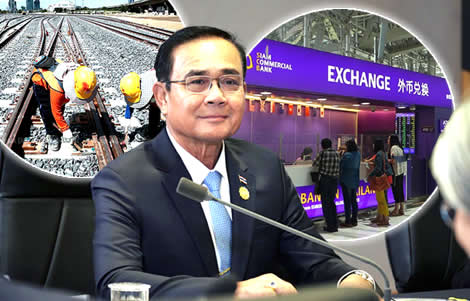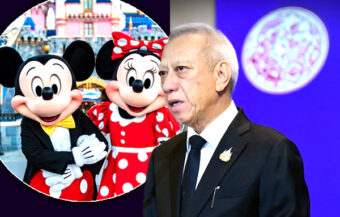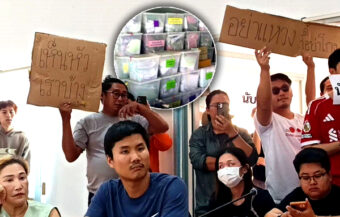The chief strategist of Krungthai Bank Jittipol Puksamatanan believes that Thailand’s massive $222 billion in foreign reserves is what is driving the appreciation of the baht amid reports that the Bank of Thailand Governor Veerathai Santiprabhob is looking at further measures and particularly reviewing the 70-year-old Exchange Control Act.
A speech by the Thai Prime Minister on Monday calling for more spending in US dollars with the help of the private sector to address the country’s slowing economy and chronic inability to rein in the appreciating Thai baht may be signal of tougher response to the issue from the government.

The Thai Prime Minister Prayuth Chan-ocha on Monday called for more expenditure in US dollars to weaken the stubbornly high Thai baht which has increased in value against the US dollar by 8.8% this year. ‘We have to think how we will spend in dollars in many ways to help weaken the baht,’ General Prayut told his audience.
Thai Prime Minister: ‘We have to think how we will spend in dollars’ to rein in the baht
He also urged Thailand’s private sector to assist the government in dealing with what is an escalating economic problem for the country. In spite of measures from the central bank which slowed the rate of appreciation, they have not yet abated the trend.
Economists now believe what is required, in the current circumstances, is a concerted effort to negatively impact the currency and move it back in the other direction.
Country’s record level of foreign reserves
The prime minister told his audience that the reason for the stout value of the Thai currency was the country’s record level of foreign reserves currently valued at $222 billion and a massive current account which at the end of September stood at $26.4 billion.
Baht still good value to investors running from the US dollar as Thailand has become a safe haven
Jittipol Puksamatanan is the Chief Strategist of Krung Thai Bank. He has recently gone on the record to say that while the Thai baht might be overvalued at this point and time relative to the country’s export performance, it is still good value in a market where investors are actively shunning the US dollar and where Thailand’s huge foreign currency reserves stand out and advertise it as a safe haven for capital.
Speech may signal a more robust government effort
Some observers today see the speech given by the Thai prime minister as significant in that it may signal a more robust effort to negatively counter the value of the Thai baht.
One of the considerations for policymakers at the central bank and Thailand’s economic team up to know has been a fear that the United States would label Thailand as a currency manipulator.
Prayut’s speech drove the baht lower on Monday
Today’s open statement by the prime minister calling on all stakeholders in the Thai economy to participate in an effort to bring the country’s currency down in value makes the government’s intentions quite clear.
In fact, the statement by the prime minister seems to have had at least a short term effect as during the day, the Thai baht weakened against the dollar ending at ฿30.28 to the greenback.
Analysts predict the baht will reach ฿28.50 in 2020
Currently, most analysts expect that the baht will stay at this level towards the end of the year but in the first half of next year, it is anticipated that the baht will again strengthen to as much as ฿28.5 against the dollar.
The last time the currency was at this level was during 2013 which provoked tensions at the time between the Bank of Thailand and the Finance Ministry.
Most commentators suggest that the optimum value for the Thai baht to the US dollar for Thailand’s export-led economy is ฿32 to the greenback.
Chinese negotiators want to be paid in US dollars for a high-speed rail link, approved by Bank of Thailand
Today’s calls by the prime minister also followed a report last week in which Chinese negotiators asked that a contract to build the new high-speed rail link between Bangkok and Nakhon Ratchasima be paid in US dollars.
The proposal was favoured by the Bank of Thailand after nervous Thai negotiators referred the professional to the normally hawkish body. It is expected that the Thai cabinet will approve the ฿50 billion transport ministry project shortly.
Bank governor reviewing the Exchange Control Act
It comes amid reports that Bank of Thailand Governor Veerathai Santiprabhob is actively reviewing all areas relating to foreign currency reserves and other areas the bank has management control which may impact the value of the Thai currency.
The governor is particularly believed to be looking at changes to the 70-year-old Exchange Control Act of 1942 as amended by ministerial regulation in 1954 in a concerted effort to thwart the rising value of the Thai baht.
These are the laws that give the Thai government the ultimate power over the levers to manage the value of the Thai currency for the benefit of the Thai public.
The law and regulations govern all trading and foreign currency transactions being conducted by Thai banks.
Moves from the Bank of Thailand to date have worked
Mr Jittipol of Krung Thai Bank believes that the actions by the Bank of Thailand have all had merit and that radical thinking outside the box will be required to deal with the issue.
Last month, the Bank of Thailand relaxed capital outflow rules and in July introduced quite effective measures to counter speculation in the Thai currency.
Strong currency reserves a legacy from the 1997 financial crisis and driven by a conservative policy
The scale of Thailand’s vast foreign currency reserves harks back to the 1997 financial crisis when the kingdom faced the exact opposite problem it is experiencing today when the bottom fell out of the Thai currency sparking a spiral of devaluation.
Since then, Thailand’s economic planners have been determined to prevent a recurrence and have driven a conservative policy which has worked at preserving financial stability.
However, the recent volatility sparked by the US-China trade war has opened up Thailand with its strong levels of currency reserves and relatively small economy to the current situation where its export-led economy is being hampered despite its financial strength.
Economic leadership still very aware of the ultimate need to preserve financial stability
Thailand’s economic planners today are also very aware that any move must preserve the country’s financial stability as the uppermost priority.
To that end, it is becoming clear that there is less room for an easing of monetary policy.
Ideal solution would be capital imports that expand the economy and provide for future growth
The emphasis now is on encouraging the country’s private and indeed public sectors to import more services and goods particularly for capital investment which may also help expand the economy internally.
Today’s speech by the prime minister in itself will help to put prospective investors on guard that from this point on, the Thai baht is no longer a one-way ticket to appreciating values and that action is being taken.
Further reading:


















